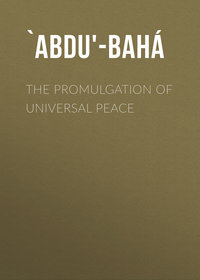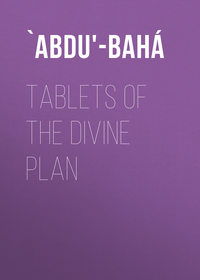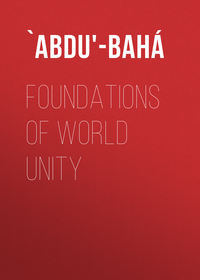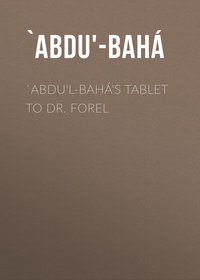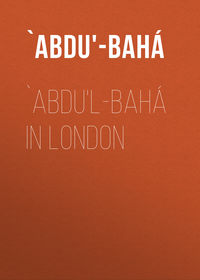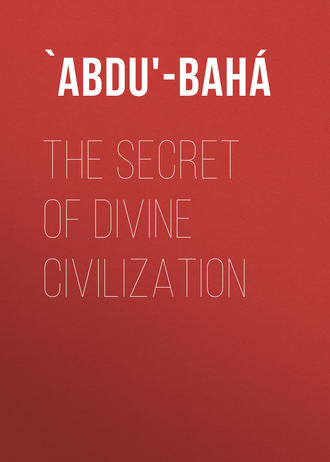 полная версия
полная версияThe Secret of Divine Civilization
With the advent of the Prophets of God, their power of creating a real union, one which is both external and of the heart, draws together malevolent peoples who have been thirsting for one another’s blood, into the one shelter of the Word of God. Then a hundred thousand souls become as one soul, and unnumbered individuals emerge as one body.
Once they were as the waves of the seaThat the wind made many out of one.Then God shed down on them His sun,And His sun but one can never be.Souls of dogs and wolves go separately,But the soul of the lions of God is one.50The events that transpired at the advent of the Prophets of the past, and Their ways and works and circumstances, are not adequately set down in authoritative histories, and are referred to only in condensed form in the verses of the Qur’án, the Holy Traditions and the Torah. Since, however, all events from the days of Moses until the present time are contained in the mighty Qur’án, the authoritative Traditions, the Torah and other reliable sources, We shall content Ourself with brief references here, the purpose being to determine conclusively whether religion is the very basis and root-principle of culture and civilization, or whether as Voltaire and his like suppose, it defeats all social progress, well-being and peace.
To preclude once and for all objections on the part of any of the world’s peoples, We shall conduct Our discussion conformably to those authoritative accounts which all nations are agreed upon.
At a time when the Israelites had multiplied in Egypt and were spread throughout the whole country, the Coptic Pharaohs of Egypt determined to strengthen and favor their own Coptic peoples and to degrade and dishonor the children of Israel, whom they regarded as foreigners. Over a long period, the Israelites, divided and scattered, were captive in the hands of the tyrannical Copts, and were scorned and despised by all, so that the meanest of the Copts would freely persecute and lord it over the noblest of the Israelites. The enslavement, wretchedness and helplessness of the Hebrews reached such a pitch that they were never, day or night, secure in their own persons nor able to provide any defense for their wives and families against the tyranny of their Pharaohic captors. Then their food was the fragments of their own broken hearts, and their drink a river of tears. They continued on in this anguish until suddenly Moses, the All-Beauteous, beheld the Divine Light streaming out of the blessed Vale, the place that was holy ground, and heard the quickening voice of God as it spoke from the flame of that Tree “neither of the East nor of the West,”51 and He stood up in the full panoply of His universal prophethood. In the midst of the Israelites, He blazed out like a lamp of Divine guidance, and by the light of salvation He led that lost people out of the shadows of ignorance into knowledge and perfection. He gathered Israel’s scattered tribes into the shelter of the unifying and universal Word of God, and over the heights of union He raised up the banner of harmony, so that within a brief interval those benighted souls became spiritually educated, and they who had been strangers to the truth, rallied to the cause of the oneness of God, and were delivered out of their wretchedness, their indigence, their incomprehension and captivity and achieved a supreme degree of happiness and honor. They emigrated from Egypt, set out for Israel’s original homeland, and came to Canaan and Philistia. They first conquered the shores of the River Jordan, and Jericho, and settled in that area, and ultimately all the neighboring regions, such as Phoenicia, Edom and Ammon, came under their sway. In Joshua’s time there were thirty-one governments in the hands of the Israelites, and in every noble human attribute—learning, stability, determination, courage, honor, generosity—this people came to surpass all the nations of the earth. When in those days an Israelite would enter a gathering, he was immediately singled out for his many virtues, and even foreign peoples wishing to praise a man would say that he was like an Israelite.
It is furthermore a matter of record in numerous historical works that the philosophers of Greece such as Pythagoras, acquired the major part of their philosophy, both divine and material, from the disciples of Solomon. And Socrates after having eagerly journeyed to meet with some of Israel’s most illustrious scholars and divines, on his return to Greece established the concept of the oneness of God and the continuing life of the human soul after it has put off its elemental dust. Ultimately, the ignorant among the Greeks denounced this man who had fathomed the inmost mysteries of wisdom, and rose up to take his life; and then the populace forced the hand of their ruler, and in council assembled they caused Socrates to drink from the poisoned cup.
After the Israelites had advanced along every level of civilization, and had achieved success in the highest possible degree, they began little by little to forget the root-principles of the Mosaic Law and Faith, to busy themselves with rites and ceremonials and to show forth unbecoming conduct. In the days of Rehoboam, the son of Solomon, terrible dissension broke out among them; one of their number, Jeroboam, plotted to get the throne, and it was he who introduced the worship of idols. The strife between Rehoboam and Jeroboam led to centuries of warfare between their descendants, with the result that the tribes of Israel were scattered and disrupted. In brief, it was because they forgot the meaning of the Law of God that they became involved in ignorant fanaticism and blameworthy practices such as insurgence and sedition. Their divines, having concluded that all those essential qualifications of humankind set forth in the Holy Book were by then a dead letter, began to think only of furthering their own selfish interests, and afflicted the people by allowing them to sink into the lowest depths of heedlessness and ignorance. And the fruit of their wrong doing was this, that the old-time glory which had endured so long now changed to degradation, and the rulers of Persia, of Greece, and of Rome, took them over. The banners of their sovereignty were reversed; the ignorance, foolishness, abasement and self-love of their religious leaders and their scholars were brought to light in the coming of Nebuchadnezzar, King of Babylon, who destroyed them. After a general massacre, and the sacking and razing of their houses and even the uprooting of their trees, he took captive whatever remnants his sword had spared and carried them off to Babylon. Seventy years later the descendants of these captives were released and went back to Jerusalem. Then Hezekiah and Ezra reestablished in their midst the fundamental principles of the Holy Book, and day by day the Israelites advanced, and the morning-brightness of their earlier ages dawned again. In a short time, however, great dissensions as to belief and conduct broke out anew, and again the one concern of the Jewish doctors became the promotion of their own selfish purposes, and the reforms that had obtained in Ezra’s time were changed to perversity and corruption. The situation worsened to such a degree that time and again, the armies of the republic of Rome and of its rulers conquered Israelite territory. Finally the warlike Titus, commander of the Roman forces, trampled the Jewish homeland into dust, putting every man to the sword, taking the women and children captive, flattening their houses, tearing out their trees, burning their books, looting their treasures, and reducing Jerusalem and the Temple to an ash heap. After this supreme calamity, the star of Israel’s dominion sank away to nothing, and to this day, the remnant of that vanished nation has been scattered to the four winds. “Humiliation and misery were stamped upon them.”52 These two most great afflictions, brought on by Nebuchadnezzar and Titus, are referred to in the glorious Qur’án: “And We solemnly declared to the children of Israel in the Book, ‘Twice surely will ye commit evil in the earth, and with great loftiness of pride will ye surely be uplifted.’ And when the menace for the first of the two came to be executed, We sent against you Our servants endowed with terrible prowess; and they searched the inmost part of your abodes, and the menace was accomplished… And when the punishment threatened for your latter transgression came to be inflicted, then We sent an enemy to sadden your faces, and to enter the Temple as they entered it at first, and to destroy with utter destruction that which they had conquered.”53
Our purpose is to show how true religion promotes the civilization and honor, the prosperity and prestige, the learning and advancement of a people once abject, enslaved and ignorant, and how, when it falls into the hands of religious leaders who are foolish and fanatical, it is diverted to the wrong ends, until this greatest of splendors turns into blackest night.
When for the second time the unmistakable signs of Israel’s disintegration, abasement, subjection and annihilation had become apparent, then the sweet and holy breathings of the Spirit of God (Jesus) were shed across Jordan and the land of Galilee; the cloud of Divine pity overspread those skies, and rained down the copious waters of the spirit, and after those swelling showers that came from the most great Sea, the Holy Land put forth its perfume and blossomed with the knowledge of God. Then the solemn Gospel song rose up till it rang in the ears of those who dwell in the chambers of heaven, and at the touch of Jesus’ breath the unmindful dead that lay in the graves of their ignorance lifted up their heads to receive eternal life. For the space of three years, that Luminary of perfections walked about the fields of Palestine and in the neighborhood of Jerusalem, leading all men into the dawn
[Pages 81–100]
of redemption, teaching them how to acquire spiritual qualities and attributes well-pleasing to God. Had the people of Israel believed in that beauteous Countenance, they would have girded themselves to serve and obey Him heart and soul, and through the quickening fragrance of His Spirit they would have regained their lost vitality and gone on to new victories.
Alas, of what avail was it; they turned away and opposed Him. They rose up and tormented that Source of Divine knowledge, that Point where the Revelation had come down—all except for a handful who, turning their faces toward God, were cleansed of the stain of this world and found their way to the heights of the placeless Realm. They inflicted every agony on that Wellspring of grace until it became impossible for Him to live in the towns, and still He lifted up the flag of salvation and solidly established the fundamentals of human righteousness, that essential basis of true civilization.
In the fifth chapter of Matthew beginning with the thirty-seventh verse He counsels: “Resist not evil and injury with its like; but whosoever shall smite thee on thy right cheek, turn to him the other also.” And further, from the forty-third verse: “Ye have heard that it hath been said, ‘Thou shalt love thy neighbor, and thou shalt not vex thine enemy with enmity.’54 But I say unto you, love your enemies, bless them that curse you, do good to them that hate you, and pray for them which despitefully use you, and persecute you; that ye may be the children of your Father which is in heaven: for He maketh His sun to rise on the evil and on the good, and sendeth down the rain of His mercy on the just and on the unjust. For if ye love them which love you, what reward have ye? Do not even the publicans the same?”
Many were the counsels of this kind that were uttered by that Dayspring of Divine wisdom, and souls who have become characterized with such attributes of holiness are the distilled essence of creation and the sources of true civilization.
Jesus, then, founded the sacred Law on a basis of moral character and complete spirituality, and for those who believed in Him He delineated a special way of life which constitutes the highest type of action on earth. And while those emblems of redemption were to outward seeming abandoned to the malevolence and persecution of their tormentors, in reality they had been delivered out of the hopeless darkness which encompassed the Jews and they shone forth in everlasting glory at the dawn of that new day.
That mighty Jewish nation toppled and crumbled away, but those few souls who sought shelter beneath the Messianic Tree transformed all human life. At that time the peoples of the world were utterly ignorant, fanatical and idolatrous. Only a small group of Jews professed belief in the oneness of God and they were wretched outcasts. These holy Christian souls now stood up to promulgate a Cause which was diametrically opposed and repugnant to the beliefs of the entire human race. The kings of four out of the world’s five continents inexorably resolved to wipe out the followers of Christ, and nevertheless in the end most of them set about promoting the Faith of God with their whole hearts; all the nations of Europe, many of the peoples of Asia and Africa, and some of the inhabitants of the islands of the Pacific, were gathered into the shelter of the oneness of God.
Consider whether there exists anywhere in creation a principle mightier in every sense than religion, or whether any conceivable power is more pervasive than the various Divine Faiths, or whether any agency can bring about real love and fellowship and union among all peoples as can belief in an almighty and all-knowing God, or whether except for the laws of God there has been any evidence of an instrumentality for educating all mankind in every phase of righteousness.
Those qualities which the philosophers attained when they had reached the very heights of their wisdom, those noble human attributes which characterized them at the peak of their perfection, would be exemplified by the believers as soon as they accepted the Faith. Observe how those souls who drank the living waters of redemption at the gracious hands of Jesus, the Spirit of God, and came into the sheltering shade of the Gospel, attained to such a high plane of moral conduct that Galen, the celebrated physician, although not himself a Christian, in his summary of Plato’s Republic extolled their actions. A literal translation of his words is as follows:
“The generality of mankind are unable to grasp a sequence of logical arguments. For this reason they stand in need of symbols and parables telling of rewards and punishments in the next world. A confirmatory evidence of this is that today we observe a people called Christians, who believe devoutly in rewards and punishments in a future state. This group show forth excellent actions, similar to the actions of an individual who is a true philosopher. For example, we all see with our own eyes that they have no fear of death, and their passion for justice and fair-dealing is so great that they should be considered true philosophers.”55
The station of a philosopher, in that age and in the mind of Galen, was superior to any other station in the world. Consider then how the enlightening and spiritualizing power of divine religions impels the believers to such heights of perfection that a philosopher like Galen, not himself a Christian, offers such testimony.
One demonstration of the excellent character of the Christians in those days was their dedication to charity and good works, and the fact that they founded hospitals and philanthropic institutions. For example, the first person to establish public clinics throughout the Roman Empire where the poor, the injured and the helpless received medical care, was the Emperor Constantine. This great king was the first Roman ruler to champion the Cause of Christ. He spared no efforts, dedicating his life to the promotion of the principles of the Gospel, and he solidly established the Roman government, which in reality had been nothing but a system of unrelieved oppression, on moderation and justice. His blessed name shines out across the dawn of history like the morning star, and his rank and fame among the world’s noblest and most highly civilized is still on the tongues of Christians of all denominations.
What a firm foundation of excellent character was laid down in those days, thanks to the training of holy souls who arose to promote the teachings of the Gospel. How many primary schools, colleges, hospitals, were established, and institutions where fatherless and indigent children received their education. How many were the individuals who sacrificed their own personal advantages and “out of desire to please the Lord”56 devoted the days of their lives to teaching the masses.
When, however, the time approached for the effulgent beauty of Muḥammad to dawn upon the world, the control of Christian affairs passed into the hands of ignorant priests. Those heavenly breezes, soft-flowing from the regions of Divine grace, died away, and the laws of the great Evangel, the rock-foundation on which the civilization of the world was based, turned barren of results, this out of misuse and because of the conduct of persons who, seemingly fair, were yet inwardly foul.
The noted historians of Europe, in describing the conditions, manners, politics, learning and culture, in all their aspects, of early, medieval and modern times, unanimously record that during the ten centuries constituting the Middle Ages, from the beginning of the sixth century of the Christian era till the close of the fifteenth, Europe was in every respect and to an extreme degree, barbaric and dark. The principal cause of this was that the monks, referred to by European peoples as spiritual and religious leaders, had given up the abiding glory that comes from obedience to the sacred commandments and heavenly teachings of the Gospel, and had joined forces with the presumptuous and tyrannical rulers of the temporal governments of those times. They had turned their eyes away from everlasting glory, and were devoting all their efforts to the furtherance of their mutual worldly interests and passing and perishable advantages. Ultimately things reached a point where the masses were hopeless prisoners in the hands of these two groups, and all this brought down in ruins the whole structure of the religion, culture, welfare and civilization of the peoples of Europe.
When the unworthy acts and thoughts and the discreditable purposes of the leaders had stilled the sweet savors of the Spirit of God (Jesus) and they ceased to stream across the world, and the darkness of ignorance and bigotry and of actions that were displeasing to God, encompassed the earth, then the dawn of hope shone out and the Divine spring drew on; a cloud of mercy overspread the world, and out of the regions of grace the fecund winds began to blow. In the sign of Muḥammad, the Sun of Truth rose over Yathrib (Medina) and the Ḥijáz and cast across the universe the lights of eternal glory. Then the earth of human potentialities was transformed, and the words “The earth shall shine with the light of her Lord,”57 were fulfilled. The old world turned new again, and its dead body rose into abundant life. Then tyranny and ignorance were overthrown, and towering palaces of knowledge and justice were reared in their place. A sea of enlightenment thundered, and science cast down its rays. The savage peoples of the Ḥijáz, before that Flame of supreme Prophethood was lit in the lamp of Mecca, were the most brutish and benighted of all the peoples of the earth. In all the histories, their depraved and vicious practices, their ferocity and their constant feuds, are a matter of record. In those days the civilized peoples of the world did not even consider the Arab tribes of Mecca and Medina as human beings. And yet, after the Light of the World rose over them, they were—because of the education bestowed on them by that Mine of perfections, that Focal Center of Revelation, and the blessings vouchsafed by the Divine Law—within a brief interval gathered into the shelter of the principle of Divine oneness. This brutish people then attained such a high degree of human perfection and civilization that all their contemporaries marveled at them. Those very peoples who had always mocked the Arabs and held them up to ridicule as a breed devoid of judgment, now eagerly sought them out, visiting their countries to acquire enlightenment and culture, technical skills, statecraft, arts and sciences.
Observe the influence on material situations of that training which is inculcated by the true Educator. Here were tribes so benighted and untamed that during the period of the Jáhilíyyih they would bury their seven-year-old daughters alive—an act which even an animal, let alone a human being, would hate and shrink from but which they in their extreme degradation considered the ultimate expression of honor and devotion to principle—and this darkened people, thanks to the manifest teachings of that great Personage, advanced to such a degree that after they conquered Egypt, Syria and its capital Damascus, Chaldea, Mesopotamia and Írán, they came to administer single-handedly whatever matters were of major importance in four main regions of the globe.
The Arabs then excelled all the peoples of the world in science and the arts, in industry and invention, in philosophy, government and moral character. And truly, the rise of this brutish and despicable element, in such a short interval, to the supreme heights of human perfection, is the greatest demonstration of the rightfulness of the Lord Muḥammad’s Prophethood.
In the early ages of Islám the peoples of Europe acquired the sciences and arts of civilization from Islám as practiced by the inhabitants of Andalusia. A careful and thorough investigation of the historical record will establish the fact that the major part of the civilization of Europe is derived from Islám; for all the writings of Muslim scholars and divines and philosophers were gradually collected in Europe and were with the most painstaking care weighed and debated at academic gatherings and in the centers of learning, after which their valued contents would be put to use. Today, numerous copies of the works of Muslim scholars which are not to be found in Islamic countries, are available in the libraries of Europe. Furthermore, the laws and principles current in all European countries are derived to a considerable degree and indeed virtually in their entirety from the works on jurisprudence and the legal decision of Muslim theologians. Were it not for the fear of unduly lengthening the present text, We would cite these borrowings one by one.
The beginnings of European civilization date from the seventh century of the Muslim era. The particulars were these: toward the end of the fifth century of the hegira, the Pope or Head of Christendom set up a great hue and cry over the fact that places sacred to the Christians, such as Jerusalem, Bethlehem and Nazareth, had fallen under Muslim rule, and he stirred up the kings and the commoners of Europe to undertake what he considered a holy war. His impassioned outcry waxed so loud that all the countries of Europe responded, and crusading kings at the head of innumerable hosts passed over the Sea of Marmara and made their way to the continent of Asia. In those days the Fátimid caliphs ruled over Egypt and some countries of the West, and most of the time the kings of Syria, that is the Saljúqs, were subject to them as well. Briefly, the kings of the West with their unnumbered armies fell upon Syria and Egypt, and there was continuous warfare between the Syrian rulers and those of Europe for a period of two hundred and three years. Reinforcements were always coming in from Europe, and time and time again the Western rulers stormed and took over every castle in Syria, and as often, the kings of Islám delivered them out of their hands. Finally Saladin, in the year 693 A.H., drove the European kings and their armies out of Egypt and off the Syrian coast. Hopelessly beaten, they went back to Europe. In the course of these wars of the Crusades, millions of human beings perished. To sum up, from 490 A.H. until 693, kings, commanders and other European leaders continually came and went between Egypt, Syria and the West, and when in the end they all returned home, they introduced into Europe whatever they had observed over two hundred and odd years in Muslim countries as to government, social development and learning, colleges, schools and the refinements of living. The civilization of Europe dates from that time.
O people of Persia! How long will your torpor and lethargy last? You were once the lords of the whole earth; the world was at your beck and call. How is it that your glory has lapsed and you have fallen from favor now, and crept away into some corner of oblivion? You were the fountainhead of learning, the unfailing spring of light for all the earth, how is it that you are withered now, and quenched, and faint of heart? You who once lit the world, how is it that you lurk, inert, bemused, in darkness now? Open your mind’s eye, see your great and present need. Rise up and struggle, seek education, seek enlightenment. Is it meet that a foreign people should receive from your own forbears its culture and its knowledge, and that you, their blood, their rightful heirs, should go without? How does it seem, when your neighbors are at work by day and night with their whole hearts, providing for their advancement, their honor and prosperity, that you, in your ignorant fanaticism, are busy only with your quarrels and antipathies, your indulgences and appetites and empty dreams? Is it commendable that you should waste and fritter away in apathy the brilliance that is your birthright, your native competence, your inborn understanding? Again, We have digressed from Our theme.




